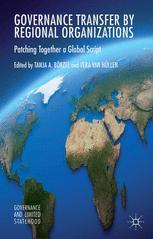Why Being Democratic Is Just Not Enough: The EU’s Governance Transfer
Tanja A. Börzel, Vera van Hüllen – 2015
The European Union (EU) is a promoter and protector of ‘good governance’ par excellence. The Europeanization of its member states and attempts at external governance transfer towards third countries have earned the EU the name of a ‘transformative’ or ‘normative’ power (cf. Börzel and Risse 2009b; Manners 2006). Yet, in comparison with other regional organizations, the EU has focused on the transformation of domestic governance institutions beyond rather than within its borders. Only recently has the EU begun to develop policies and instruments that explicitly aim at protecting the very norms and values within its own member states that it has sought to transfer to accession candidates, neighborhood countries, and third states. Not only has the emergence of a comprehensive policy for internal governance transfer lagged behind the establishment of the EU’s external policy by ten years; it is also much weaker than the EU’s rhetoric and its practice of external governance transfer would suggest. This is all the more puzzling since problems with democratic pluralism, the independence of the judiciary, or minority rights, in both old and new member states, question the extent to which the EU has been effective in promoting and protecting governance standards internally.

